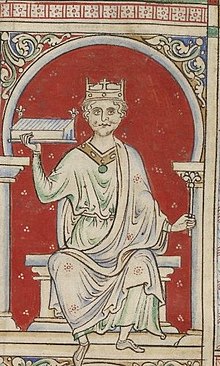King William Rufus
| William II | |
|---|---|

William II, from the Stowe Manuscript
|
|
| King of England (more...) | |
| Reign | 9 September 1087 – 2 August 1100 |
| Coronation | 26 September 1087 |
| Predecessor | William I |
| Successor | Henry I |
| Born | c. 1056 Normandy, France |
| Died |
2 August 1100 (aged c. 43–44) The New Forest, England |
| Burial | Winchester Cathedral |
| House | House of Normandy |
| Father | William I of England |
| Mother | Matilda of Flanders |
William II (Old Norman: Williame; c. 1056 – 2 August 1100), the third son of William I of England, was King of England from 1087 until 1100, with powers over Normandy, and influence in Scotland. He was less successful in extending control into Wales. William is commonly known as William Rufus (Rufus being Latin for 'the Red'), perhaps because of his red-faced appearance or, more likely, due to having red hair as a child that grew out in later life.
He was a figure of complex temperament: capable of both bellicosity and flamboyance. He did not marry, nor did he produce any offspring, legitimate or otherwise, which has led to speculations of possible homosexuality by historians.. He died after being struck by an arrow while hunting, under circumstances that remain unclear. Circumstantial evidence in the behaviour of those around him raise strong but unproven suspicions of murder. His younger brother Henry hurriedly succeeded him as king.
Barlow says he was "A rumbustious, devil-may-care soldier, without natural dignity or social graces, with no cultivated tastes and little show of conventional religious piety or morality—indeed, according to his critics, addicted to every kind of vice, particularly lust and especially sodomy." On the other hand, he was a wise ruler and victorious general. Barlow finds that, "His chivalrous virtues and achievements were all too obvious. He had maintained good order and satisfactory justice in England and restored good peace to Normandy. He had extended Anglo-Norman rule in Wales, brought Scotland firmly under his lordship, recovered Maine, and kept up the pressure on the Vexin."
William's exact date of birth is not known, but it was some time between the years 1056 and 1060. He was the third of four sons born to William the Conqueror and Matilda of Flanders, the eldest being Robert Curthose, the second Richard, and the youngest Henry. William succeeded to the throne of England on his father's death in 1087, but Robert inherited Normandy. Richard had died around 1075 while hunting in the New Forest.
...
Wikipedia
